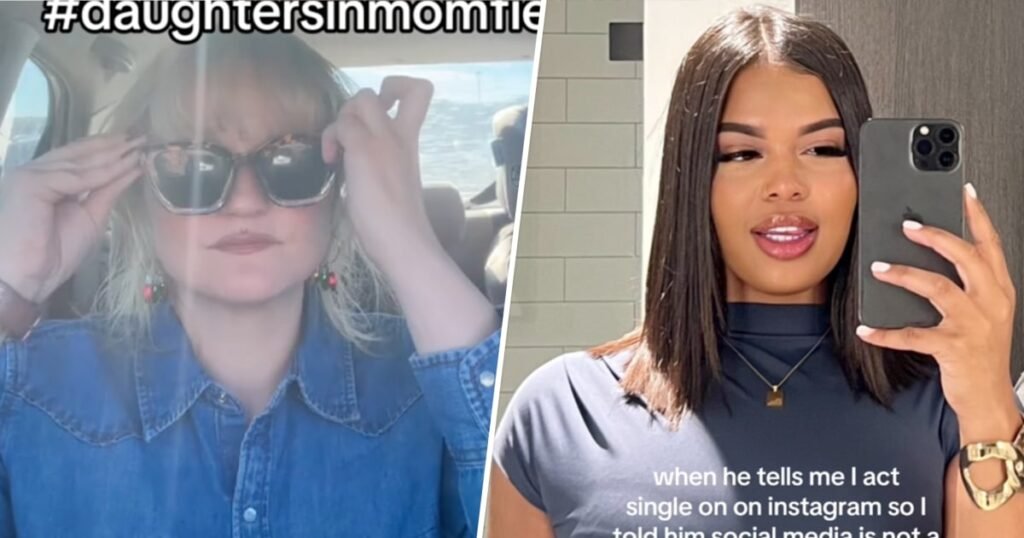
Unpacking the ‘Women in Male-Dominated Fields’ TikTok Trend: Insights into Toxic Patterns
Social media users are engaging in a unique perspective — and gaining a sense of empowerment through the viral #WomenInMaleFields trend, which cleverly employs dark humor to address significant issues.
In these videos, women recount toxic experiences they’ve encountered with men, but frame it as if they were the ones undertaking these troubling actions.
“When you switch who is narrating, it becomes absurd. It truly highlights how outrageous it is for someone to behave that way,” explains Julie Lundy, a 36-year-old content creator who took part in the trend, to TODAY.com.
“It provides us an opportunity to reveal to men what they are doing — how aware we are,” says Yari Ceballos, 26, in a conversation with TODAY.com. “It allows us to turn the tables a bit, symbolizing that ‘You’re not in charge. I know what I’m permitting you to do, but I could do it too.’”
Ceballos, a tattoo artist based in Miami, created a video for the trend to express the challenges she faces that come with “being a woman.”
The trend’s title reflects the notion that women have historically been marginalized in male-dominated careers.
Although not every video uses the same audio, many feature a sped-up rendition of “Anaconda” by Nicki Minaj. This song selection appears intentional, as Minaj sampled Sir Mix-A-Lot’s 1992 hit “Baby Got Back,” flipping the script from male objectification to female body celebration.
Certain videos within the trend focus on workplace dynamics, professional challenges, and societal expectations placed on women.
One creator humorously challenged the presumption that she couldn’t complete a PhD program, writing, “He said he was pursuing a PhD, so I asked, ‘Are you going to quit the degree once you have kids?’”
Envisioning an airplane dialogue, Tori Dunlap, the mind behind the account @herfirst100k, remarked, “When he’s in business class and I inquire about what his husband does for work.”
A neurology resident shared her video expressing frustration over the common misconception that she is a nurse, stating in her clip, “He walked in wearing scrubs and introduced himself as the medical student/resident doctor, and I ended my call saying, ‘Oh wait, the nurse just arrived.’”
Furthermore, many videos from the trend delve into dating dynamics and relationship behavior, similar to Ceballos’ TikTok, where she mentions, “When he tells me I act single on Instagram, I told him social media isn’t a genuine place.”
One video contemplated a nonchalant reply to a man expressing his feelings: “He sent me a long message about how he felt, and I replied, ‘I don’t know what you want me to say right now.’”
Another wrote, “He was upset in bed, so I said, ‘Here we go again’ and turned over to sleep.”
Model Brooks Nader showcased a video with the caption, “Me after pulling the, ‘I’m not looking for a relationship, but I’m down to hang out’ card after acting like we are in a relationship for two months.”
Some videos comment on parenting (leading to the spinoff #MomsInDadFields).
“When he claims he needs assistance with the kids, so I just emulate him and sit in the bathroom for an hour on my phone,” wrote one woman in a TikTok.
“He’s departing for a work trip, so I reminded him to ensure the laundry is finished, dinners are prepared, backpacks packed, a sitter arranged, and a cleaning service scheduled before he returns,” Lundy noted in one of her videos.
Lundy, a 36-year-old mother of three, believes the trend provides “an amusing perspective” on the authentic discussions she has with her husband.
The TikTok phenomenon has expanded to various relationship types, including “daughters-in-law in mother-in-law fields,” utilizing #DilInMilFields, or daughters with complicated relationships with their mothers, using #DaughtersInMomFields.
Nonetheless, regarding the fundamental essence of the trend — exposing unhealthy behaviors men exhibit towards women — some individuals ponder whether these videos encourage female empowerment or normalize the acceptance of mistreatment.
Clinical psychologist Avigail Lev, Psy.D., shares with TODAY.com that she can see how the trend might be “beneficial.”
“It highlights issues in dating that women often feel isolated in, and they realize, ‘Oh, this isn’t just me. This is a shared experience. It’s not my fault. It’s a widespread issue,’” she observes.
In the comments, women express feeling validated by the trend. One commenter remarked below a video about communication styles that it was “so spot on,” while another said, “this trend is the therapy none of us knew we needed!”
“I wholeheartedly support women coming together, recognizing shared experiences, and uplifting one another. I also champion women standing up against these negative behaviors,” Lev states.
However, Lev does not view the trend as a “sustainable coping mechanism.” Instead of empowerment, she argues that one might interpret it differently — the videos could “normalize” toxic relationships.
“Women endure a lot and tend to tolerate it, which is a concern,” she states.
Lev highlights videos created by women still entangled in relationships with the men under discussion. “In this context, she’s also indicating, ‘I’ve tolerated this and I allow it,'” she notes. “You’re showcasing what you put up with.”
Lundy, who specializes in motherhood and parenting coaching, created a follow-up video to her participation in the trend, detailing her circumstances and providing others with “tools and resources to address these challenges.”
“Ultimately, I am the one spending all day with the baby, while he only spends a few hours each day, so he won’t be the expert, and I can’t hold that expectation,” she explains to TODAY.com.
Currently, Lundy narrates her actions with the baby “out loud” when her husband is present. “‘Oh look, the baby’s crying like this, which indicates he’s hungry.’ Or ‘he had a meal an hour ago and is crying this way, indicating he’s tired.’ This way, everyone can start to learn these cues too,” she shares.
Lundy warns that trends like these can lead individuals to adopt a “victimhood mentality” and believes people “should be seeking solutions” instead.
“From a trend perspective, it’s all in good fun,” she remarks. “It’s humorous, delightful, and cathartic. But from a sincere woman-to-woman standpoint, I prefer discussing, ‘Yes, my husband and I faced this challenge, but here’s how we navigated it and emerged positively.’”



